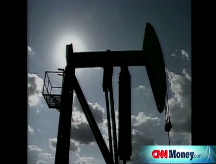Oil production lagging - U.S. official
Energy secretary says that United States and other nations must conserve more. Speculators not to blame for high prices, he adds.
JEDDAH, Saudi Arabia (CNN) -- The reason for record-high oil prices, which are putting the squeeze on the United States and others worldwide, is that oil production has not kept pace with increasing demands, U.S. Energy Secretary Samuel Bodman said Saturday.
"All nations must be better at conservation, and the U.S. is at the top of that list," said Bodman, who met with journalists ahead of a Sunday international meeting of oil producing and consuming nations focusing on high oil prices.
While some have blamed speculators for driving up oil prices, Bodman said he did not believe they are the cause.
Since 2003, he said, global demand for oil has increased because of industry in China, India and the Middle East. But from 2005 to 2007, there was very little increase in supply.
Nations need an additional supply of energy to market, whether that energy is nuclear, coal, fossil fuels, solar or wind power, Bodman said.
But, "we spent 30 years digging ourselves into this hole," he said. "It won't be solved soon."
He said so far, he has not seen a "magic bullet" to solve the problem of high oil prices. But Bodman said what he'd like to see is an increase in the oil inventory, saying more inventory and capacity are needed.
Saudi oil minister: 'International problem'
A key adviser to Saudi Arabia's oil minister told CNN in an exclusive interview on Friday that a number of factors, including speculators and currency fluctuations, are to blame for rising oil prices.
"We need stability," said Dr. Ibrahim al Muhanna, adding that Saudi Arabia would like to see producers, consumers and distributors cooperate.
Saudi Arabia has agreed to increase its oil output by 200,000 barrels a day, officials said.
"This is an international problem," Prince Abdel Aziz bin Salman, deputy Saudi oil minister, told CNN. He said the goal of the talks is not to assign blame, but to help figure out the causes behind rising oil prices and come up with remedies and plans of action.
But, he said, prices may not fall in the near future after the meeting. "I think it will be unfair to gauge the success or failure of this meeting by how prices in the short term would perform."
While officials hope the conference helps bring security and stability in the oil market, he said, "we're here to be reasonable, honest with ourselves, clear with an agenda to move forward and very serious on working together to get there ... what will work is a collective, problem-solving approach."
Bush seeks more offshore drilling
Bodman said President Bush is concerned about the price of oil, saying he brings up the subject with the Department of Energy nearly every day. He said he meets several times a week with Bush, and the two discuss the issue as well.
On Wednesday, Bush asked Congress to permit drilling for oil in deep water off the U.S. coast to combat rising oil prices. He also renewed his demand that Congress allow oil drilling in Alaska's Arctic National Wildlife Refuge, clear the way for more refineries and encourage efforts to recover oil from shale in areas like the Green River Basin, which encompasses parts of Colorado, Utah and Wyoming.
"In the short run, the American economy will continue to rely largely on oil, and that means we need to increase supply here at home," Bush said in a Rose Garden statement.
The Saudis, too, are concerned about rising oil prices, Salman said. "We believe it is going to lead to serious consequences in the future ... we feel that what you see now is a bubble. It could burst."




